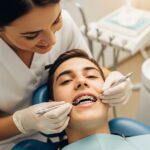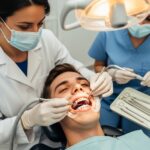Feeling excited while waiting and preparing to get the braces on is normal, but achieving that perfect and dreamy smile comes with a lot of challenges. These may include discomfort and a delay in the process, which nobody wants. So, you must have the exact information and make the right choices when it comes to caring for the braces so that you can avoid the issues of soreness or discomfort.
In this article, I will share some easy-to-follow braces maintenance tips, guidance on eating with braces, and the best steps to orthodontic self-care. If you follow these pieces of advice, you will be comfortable through the process so that the braces work as efficiently as possible.
Importance of Proper Braces
Proper brace care is critical for staying on schedule with your treatment. Issues like soreness, excess food, and even broken brackets can lead to severe delay that extends the time you need to wear braces. Also, tooth decay or even gum disease can occur.
Using more effort and following some suggestions can give you a better experience with the braces. Whether you are getting braces for the first time or have had them for some time, the best braces care practices will go a long way in keeping everything in order.
Braces Maintenance Tips
Keeping your braces well-maintained is your best bet to prevent issues. Here is a short list of tips to maintain your braces.
1. Cleaning Braces Properly
Cleaning your braces is necessary to avoid discomfort and gaps in your progress. If food debris or plaque builds around the brackets, the wearer risks gum inflammation, cavities, and infections. To keep your braces clean, you should brush at least twice a day with a soft-bristle toothbrush.
Fluoride toothpaste is excellent at preventing cavities and is highly recommended. In addition, use an interdental brush specifically designed to clean between the brackets and wires. Braces make flossing a challenge for most people, but with a bit of creativity, using floss threaders or orthodontic floss makes cleaning around the brackets easier. If you stick with a cleaning routine, you can reduce the chances of soreness, discomfort, and delayed progress.
2. Prevent Broken Brackets
Dealing with broken brackets is a common issue that can slow down your treatment. These small parts are necessary to hold your teeth in position. When broken, braces cause significant delays. To prevent broken brackets, avoid hard, sticky, or chewy foods that can place extra pressure on your braces.
Caramel, nuts, popcorn, or chewy candies can break or loosen your brackets. Getting your food in smaller portions can help reduce the effort. The moment that you break a bracket, the first thing that you should do is to call your orthodontist so that you can avoid further delays.
3. Avoid Pain with Braces
With each adjustment, it is normal for a person to feel some discomfort. Still, the pain can be reduced by using ibuprofen or acetaminophen shortly after the braces have been tightened. Cold compresses can help reduce swelling near the area of discomfort, so it is fine to apply them.
Eating soft foods during the first days after an adjustment can also help relieve pressure on the teeth, thus making eating more comfortable. For additional relief, you can also apply orthodontic wax on areas of the braces that are rubbing against the gums or the insides of the cheeks. This preventative step can avoid unnecessary sores and irritation.
4. Regular Check-Ups
Staying on track with your orthodontic appointments is very important to avoid delays in your treatment. During these check-ups, your orthodontist checks the status of your braces, makes necessary adjustments, and solves any problems you may have.
These visits are generally 4 to 6 weeks apart, but you should always listen to your orthodontist. Missing your appointments can result in slower progress, and in some cases, opportunities to address minor problems before they turn into larger issues may be missed.
Advice for Eating with Braces
If you just received your braces, you will have to adjust your eating habits. While it can be challenging to get used to chewing with the new brackets and wires, some strategies will help you minimize discomfort.
Avoid Hard and Sticky Foods
As said earlier, chewy or sticky foods can break braces, wires, or brackets. If they get stuck in your braces, cleaning will become more difficult. For the best results, avoid eating raw carrots, apples, popcorn, gum, and candy; instead, choose rice, soup, or yogurt. It is also advisable for you to chop apples or carrots into bite-sized pieces and chew them carefully.
Cut Food into Smaller Pieces
It becomes easier to eat your food when you cut it into smaller pieces. It will avoid hassle while using braces. This not only reduces the discomfort but also prevents damage from wearing the braces. It demands gentle chewing, which protects your mouth, gums, and the internal mouth from irritation or injury.
Be Mindful of Temperature
Eating something cold usually helps in releasing pain and pressure, but you should always be mindful of extreme temperatures. Foods that are too cold or too hot tend to increase the sensitivity of teeth, too. For this purpose, opt for lukewarm or room-temperature foods so that you don’t have an extra irritation.
Braces Care for Teens
If you use braces as a teenager, it comes with a responsibility to maintain a healthy routine. Teens may find it difficult to follow the care routines for their braces, but the benefits far outweigh the inconvenience. Remember, the sooner you get used to these care habits, the easier it will be in the long run.



